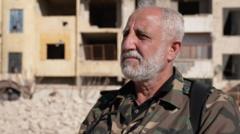The sentiment among many Syrians toward Russia is one of enmity, fueled by memories of devastation attributed to its military support for the Assad regime amid the ongoing civil war. Ahmed Taha, a rebel commander from Douma, characterizes Russia as an adversary, stating, "For us, Russia is an enemy." This perspective echoes across communities impacted by years of conflict, as numerous individuals recount the destruction wrought upon their neighborhoods.
Historically, Russia and Syria have been entrenched partners: since its intervention in 2015 when the regime faced potential collapse, Russia secured significant military and strategic advantages, including naval and air bases along the Mediterranean coast. This partnership, while beneficial to Russia in asserting its influence regionally and globally, has left many Syrians feeling betrayed and disillusioned.
As the Assad regime crumbles, numerous voices throughout Syria call for the expulsion of Russian forces, akin to the withdrawal of Iranian troops. Mouna Ali Mansour from Hafir al-Tahta poignantly states, "Russia should leave Syria, just as Iran has left." Despite the Kremlin’s denial of war crimes and insistence on targeting terrorist factions like ISIS, international bodies maintain that substantial violations occurred, implicating both Russia and the Assad regime.
Reports from international observers detail a litany of airstrikes and systematic sieges in cities such as Aleppo and Douma, which resulted in severe humanitarian crises and loss of civilian life. The destruction of infrastructure—schools, hospitals, and essential supply routes—amplifies the grievances against Russia among civilians and former rebels alike.
Conversely, the interim leadership in Syria presents a more complex picture regarding future relations with Russia. Ahmed al-Sharaa, now a leader seeking to stabilize the nation, has indicated an openness to continued cooperation, framing the relationship as "strategic." Russian Foreign Minister Sergey Lavrov reciprocated this sentiment, highlighting the potential for collaborative efforts moving forward.
The crux of the matter lies in Syria's military dependency on Russian support, a legacy dating back to Soviet-era arms supplies. Defense analysts like Turki al-Hassan suggest that without Russian matériel, rebuilding Syria’s military capabilities will be challenging, making a complete rupture of relations complicated.
Negotiations around the future of Russian bases and military presence in Syria underscore this dilemma. Russian officials have adopted a cautiously optimistic approach, emphasizing humanitarian assistance and support for reconstruction as means of influencing the new Syrian leadership. The UN representative for Russia has highlighted this as a pivotal moment for Syria’s future.
As the nation grapples with its post-Assad reality, a delicate balance must be struck between the urgent desires of the populace for liberation from prior oppressors and the strategic necessities delineated by historical ties with Russia. The path forward remains fraught with challenges that will require astute political maneuvering and a reassessment of alliances forged in conflict.


















